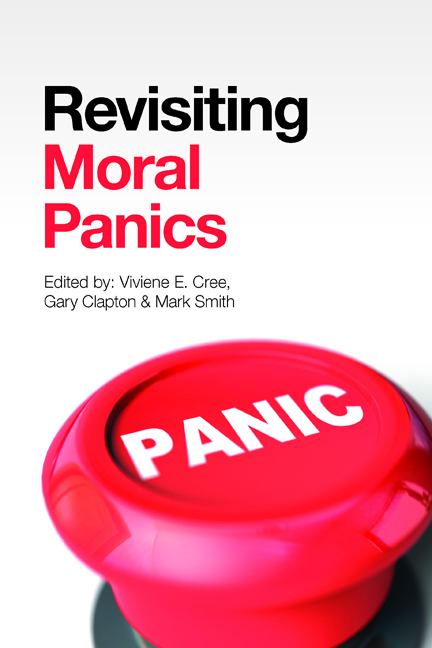Book contents
- Frontmatter
- Contents
- Contributors
- Preface
- Commentary moral panics yesterday, today and tomorrow
- Part One Gender and the family
- Part Two Moral panics in our time? Childhood and youth
- Part Three The state, government and citizens
- Part Four Moral crusades, moral regulation and morality
- Afterword the moral in moral panics
- Conclusion Moral panics and beyond
- Index
Three - Making a moral panic: ‘feral families’, family violence and welfare reforms in New Zealand. Doing the work of the state?
Published online by Cambridge University Press: 08 March 2022
- Frontmatter
- Contents
- Contributors
- Preface
- Commentary moral panics yesterday, today and tomorrow
- Part One Gender and the family
- Part Two Moral panics in our time? Childhood and youth
- Part Three The state, government and citizens
- Part Four Moral crusades, moral regulation and morality
- Afterword the moral in moral panics
- Conclusion Moral panics and beyond
- Index
Summary
Introduction
New Zealand is in the midst of a campaign to cut welfare spending, aligned to the ‘austerity’ discourse preoccupying many countries. Over the period 2011–14, two significant government projects were developed side by side: a programme of welfare reforms (Welfare Working Group, 2011) and a new programme of interventions aimed at reducing the incidence of child abuse (Ministry of Social Development (MSD), 2012b). The two projects emanated from the same arm of government, the MSD, but they were not linked in their everyday activities. Both projects have generated significant public interest and are imbued with ideological content.
Negative framing of the poor – alongside amplified expressions of class disgust – amid the on-going programme of welfare reform has been noted elsewhere (Tyler, 2013). Links between child maltreatment and welfare claimants are also common (Warner, 2013). An analysis of the media discourse on welfare families in New Zealand has found significant linking of family violence to poverty and ‘beneficiary’ or claimant status, most noticeable in examination of the commentary on ‘opinion pieces’ or columns. A battle of words rages between advocacy groups (Wynd, 2013) that research poverty in New Zealand and those who would link the issue of ‘welfare families’ to child abuse and neglect.
This chapter explores the construction of a ‘feral families’ discourse in the New Zealand print media and considers whether this construction may constitute an example of the ‘folk devil’ so often manifest in a moral panic. Such families are characterised as being welfare dependent, prone to violence and predominantly Maori.
Framing of the poor
In all discussions of moral panics, the role of the media is germane. Iyengar (1990, p 19) argued that ‘how people think about poverty is shown to be dependent on how the issue is framed’. Iyengar's influential paper on media framing associates the psychological conception of framing – ideas and terms employed to propose and consider choices – to the way mass media influence public opinion on the major social issues. In contemporary society ‘media’ is no longer a monolithic category. While the press and broadcast media may maintain significant influence on the framing of social problems, they are also subject to immediate challenge. A good recent example is the tranche of opinions of citizens, politicians and journalists that followed the screening of the television programme Benefits Street (Channel Four, 2014).
- Type
- Chapter
- Information
- Revisiting Moral Panics , pp. 29 - 38Publisher: Bristol University PressPrint publication year: 2015
- 1
- Cited by

